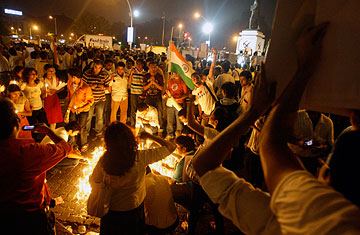
Residents of Mumbai, India, march in the streets on Dec. 3, 2008, to protest against the recent attacks on their city
Two suspected militants were killed by Indian authorities Friday night after trying to cross the border into Kashmir near the village of Dardpura. Two AK-47s were recovered from them, along with ammunition. That encounter, police say, is part of a slight increase in infiltration by militants from Pakistan over the last few months.
That development added to the growing evidence of both infiltration from Pakistan and local Indian collusion in the siege of Mumbai. Early on Saturday, Indian authorities revealed that two men had been arrested for illegally providing SIM cards to the attackers; one of them is believed to be a police officer from the Indian-occupied half of the disputed region of Kashmir, who reportedly had contact with members of Lashkar-e-Taiba (LeT), the group who are under suspicion for orchestrating the Mumbai attacks. It is the first evidence so far that the attackers had help within India.
The LeT, a group that is believed to have its organizational roots in Pakistan, has been active in Kashmir for more than a decade, sending in fighters from Pakistan and sometimes recruiting local Kashmiris. The LeT is one of many militant groups that have agitated here, often violently, against India. Indeed, India and Pakistan have fought two wars over the disputed territory of Kashmir; and just as the Mumbai massacre was at its peak, a threatening Nov. 28 hoax phone call, purportedly from the Indian foreign ministry, to Pakistani President Asif Zardari convinced Islamabad to move several of its troops toward the Indian frontier for fear of an attack from New Delhi. Meanwhile, one of the Mumbai attackers mentioned Kashmir in a rambling interview with the India TV news channel during the siege — "Are you aware how many people have been killed in Kashmir?" he asked — immediately raising the specter of a link between militants in Kashmir and those in Mumbai.
Despite the news, there seems to be a consensus within Kashmir — among government and intelligence officials, separatist leaders, local civil society groups and experienced observers of the Kashmir conflict — that there is no direct link between militants active in Kashmir and the ones who planned and executed the brutal Mumbai attacks. "It's like al-Qaeda talking about the Palestinian issue," says one longtime analyst of Kashmiri politics. "It's just a cover." And some local activists fear the Mumbai terrorists may have hurt the cause of Kashmiri independence. Says one: "People are not happy about having Kashmir being dragged into this."
The fearsome technique used in Mumbai — a combination of machine-gun-firing and grenade-throwing — is familiar in Kashmir, and known here as a "fidayeen" attack. But Kashmiri journalists and political activists note that militants here typically target symbols of the Indian state, not public places. The city of Srinagar, a hill station that was once a magnet for tourists escaping India's summer heat, is blotted with blackened government buildings burned out in fidayeen attacks.
While the tactics may have been perfected here, Ashok Bhan, director of police intelligence in Kashmir, says he does not think there were any operational links between Mumbai and Kashmir. "Big operations like this would not be planned in India," he says. That doesn't mean LeT has disappeared from the area. There have been at least 35 suspected terrorists who have crossed the border from Pakistan over the last few months — and about as many who have been killed by Indian troops, Bhan says, but he says he has seen no evidence of any unusual activity. The increase, he says, is connected to the state elections under way in Kashmir. Many separatist groups have called for boycotts of the elections, and militant groups, authorities say, have been trying to cross into Kashmir to disrupt the polling, which is conducted in five stages. The fourth one is scheduled for Sunday, Dec. 7.
Still, there is little that's known for certain about the Mumbai attacks, and authorities in Kashmir have not ruled out any possibilities. The unusual nature of the attack — fidayeen tactics but without a clear ideology — and its logistical sophistication suggest that more than one group may have been involved. Sudhir Bloeria, a senior advisor to the governor of the state, says that while the Kashmir militancy may be on the wane, the Mumbai attacks have prompted officials in the state to look more closely at the connections among the various groups operating in the area, including LeT. "Mumbai adds a new dimension to the problems we have," he says. "It gives a little more sense of urgency."
